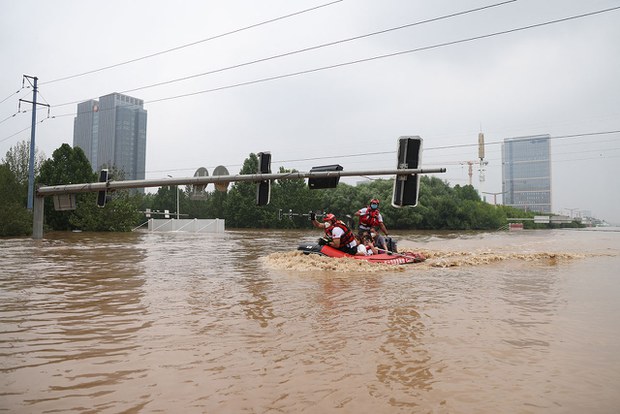Zhou Yi, chinaworker.info
The current floods in northern China, in the wake of super typhoon Doksuri, have rung a new alarm bell over capitalist-driven climate change but also catastrophes caused by authorities’ disregard for the safety of the masses. From July 29 to August 2, heavy rainfall occurred in North China, with precipitation breaking a 140-year record in the Beijing area. Subsequently, the disaster spread to provinces in northeast China. Meanwhile, factors such as failure to notify residents to evacuate before discharging flood waters from overfull reservoirs (only issuing a warning about rising water levels and to avoid activities near river banks), sacrificing other regions to save Xi Jinping’s pet “achievements”, and rejecting assistance from outside rescue teams have exacerbated the situation. Among the affected areas, Hebei Province has been hit the hardest.
At the time of writing this article (August 8), there have been at least 41 deaths, 32 people missing, and over 2 million people affected in the Beijing-Tianjin-Hebei region due to the floods. Among the severely affected areas is Zhuozhou (administered by Baoding city) in Hebei Province, where the homes of many residents have been completely destroyed. Cars and furniture have been washed away or ruined by the flood waters, and farmers have suffered significant livestock losses. The waiting time for post-disaster reconstruction is very long.
During his inspection of the disaster-stricken areas in Baoding and Xiong’an New Area on August 1-2, Ni Yuefeng, the Secretary of the Hebei Chinese Communist Party (CCP) Provincial Committee, declared that Hebei must “resolutely serve as a moat for the capital”, which drew anger from many netizens (especially those from Hebei) as an attempt to show loyalty to Xi Jinping. In reality, geographically speaking, the upstream mountainous areas in the western part of Beijing, which is to the north of Zhuozhou, cannot have reservoirs constructed or discharge flood waters from there. Additionally, the Yongding River, which drains flood waters from the eastern part of Beijing, does not pass through Zhuozhou. Therefore, in contrast to government statements, the suffering of Zhuozhou is likely a sacrifice made to save Xiong’an New Area to its south.
Xiong’an New Area is a new city being built on orders from Xi and referred to as a “millennium project”. It has been plagued by various issues since its initial planning and design in 2017. The selected site is located in a marshy area with low terrain. During severe flooding, the freshwater lake Baiyangdian within the area must discharge flood waters, highlighting a significant risk of water-related disasters. Furthermore, even after six years of development, Xiong’an New Area remains a “ghost town” with many unfinished projects, failing to fulfill its intended role of relieving non-capital administrative functions from Beijing. However, as this project is personally decided by Xi Jinping and is considered his project, the dictatorship is still willing to “spare no expense” to protect Xiong’an New Area, adding to the woes of the ongoing flooding.
In another heavily affected area, Bazhou in Hebei Province, affected local residents protested in front of the city government on August 4, displaying a banner that read “Give back my home. The disaster is caused by flood discharge, not the rain”. They engaged in intense clashes with police there. A day later, the Bazhou government issued an open letter, expressing “heartfelt thanks and profound respect” to the affected households for “following orders and responding positively”. Using these diplomatic words, the government attempted to pacify public anger. In the same open letter, the city government also promised comprehensive compensation for the affected and post-disaster reconstruction. However, after the floods in Henan two years ago, various problems arose regarding almost 10 billion RMB (US$1.4 billion) in reconstruction funds, including issues with construction quality, falsified project commencement and completion dates, and more. This exposed serious corruption within the CCP regime. Under the authoritarian capitalist regime of the CCP, where independent trade unions do not exist, and workers lack the power to oversee projects, we cannot believe that local governments accountable to higher authorities will genuinely compensate the affected households and conduct effective post-disaster reconstruction.
The current flood disaster is not an isolated issue but is connected to global climate change, driven by capitalism’s destruction of the planet. On July 16, Turpan in the western Xinjiang region recorded an extreme high temperature of 52.2C, breaking records, and the resulting drought threatens local cotton production. Worldwide, July 2023 was the hottest month ever recorded. It was marked by heatwaves and wildfires around the world. Higher sea temperatures lead to more tropical storms and typhoons like Doksuri, which has lasted twice as long as the six days average for a typhoon.
This year, the UN Intergovernmental Panel on Climate Change reported that the risks of global warming are exceeding previous forecasts and the world could reach the 1.5C threshold in the “near term”. This is the danger point at which irreversible changes to the planet are predicted to take hold, causing mass extinction of wildlife, rising sea levels, melting of polar ice caps and other catastrophic impacts. The CCP does not discuss the climate change issues behind the floods, as an increased public awareness of climate change would make it harder for the CCP to increase coal power plant construction and fossil fuel extraction. The CCP also fears that raising awareness of climate change could ignite international consciousness among the public, which would clash with the regime’s promotion of nationalist ideology.
The capitalist CCP regime, like other capitalist regimes, is incapable and unwilling to fully transition to green energy. Superficial fixes or global climate talking shops convened by various governmental bodies are ineffective. The current situation indicates that we need real climate action based on the international working class, which involves nationalisation of key sectors of the economy (including the energy sector), putting them under workers’ democratic control to fast forward the necessary green transition. Collaboration across the globe for the development of green energy, planned production, and the encouragement of green energy-related research is needed to unleash the potential of the masses and save the planet before it is too late. By fighting to end the planet-burning dictatorship of the CCP and capitalism, the massive Chinese working class can and will play a crucial role.




